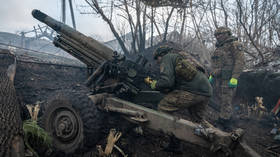Global food prices hit six-year high as Covid-19 pandemic turns into major driver of food inequality

World prices for food commodities saw a steep year-on-year increase in November, hitting an almost six-year high, with the index posting its sharpest monthly spike since July 2012, according to the United Nations food agency.
The index, published by the Food and Agriculture Organization (FAO), rose to 105.0 points last month against 101.0 in October, showing a 3.5 percent monthly increase. The index, which reflects monthly changes for a basket of cereals, oilseeds, dairy products, meat and sugar, hit the highest level since December 2014.
According to the Rome-based agency, prices for vegetable oil were leading in the surge, growing by 14.5 percent against the previous month, reportedly due to a jump in palm oil prices.
Also on rt.com Fed’s Covid cure far more harmful to US economy than the disease – Peter SchiffCereal prices demonstrated a more modest month-on-month increase of 2.5 percent, although they were still almost 20 percent above last year’s level. Prices for wheat grew due to “reduced harvest prospects” in Argentina, with maize prices lifted partly by lower crop forecasts in the United States and Ukraine. Rice reportedly held steady.
Prices for meat and dairy were 0.9 percent above the figure posted in October. Meat prices were down 13.7 percent during the same period in 2019, but bovine, ovine, and pig meats saw monthly increases.
Concerns over a potential shortfall in the global production of sugar amid poor crop prospects in the European Union, Russia, and Thailand boosted prices for the commodity by 3.3 percent. The dairy index climbed 0.9 percent to an almost 18-month high, partially pushed by firmer butter and cheese prices.
Also on rt.com From Russia with wheat: Exports by global grain superpower on track to hit record highThe FAO said the Covid-19 pandemic was proving to be “an important driver of the levels of global food insecurity,” as the hike in prices became an extra burden for those whose income had fallen because of coronavirus.
“The pandemic is exacerbating and intensifying already fragile conditions caused by conflicts, pests, and weather shocks, including recent hurricanes in Central America and floods in Africa,” the agency reported.
According to the FAO, 45 countries, 34 of them in Africa, continued to need external help to secure enough food.
For more stories on economy & finance visit RT's business section














